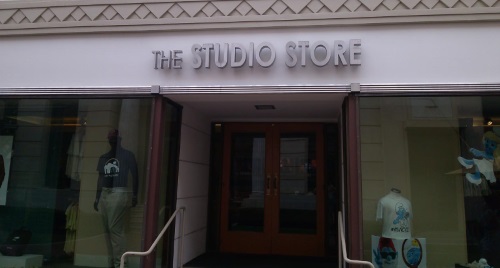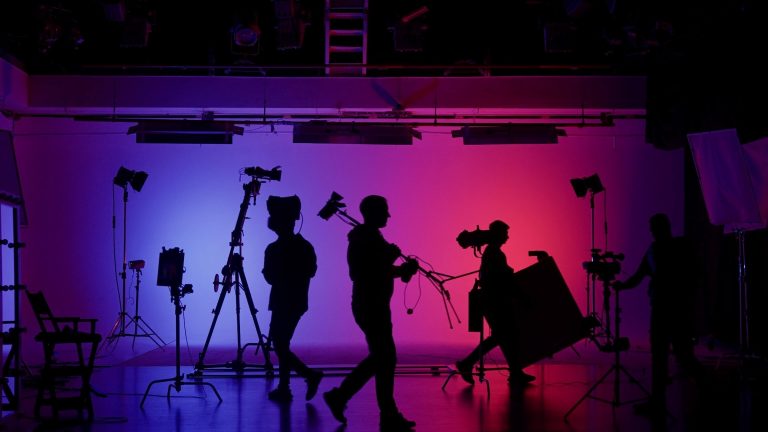
What are some secret ways to break through, over, under, or around the Hollywood walls that are keeping aspiring screenwriters, producers, and filmmakers from their dream careers within the film and television industry?
Some secrets being kept in the world are often hidden in plain sight — not necessarily being kept by anyone, mind you. Just overlooked, overshadowed, or underappreciated. That "off the beaten path" trail leading to a beautiful waterfall. That amazing restaurant with no clear and distinct sign or advertisement. And in this case, those jobs or methods of approach that can help you gain easy entrance into the seemingly impenetrable film and television studio system.
Hollywood can be frustrating to navigate. Opportunities are usually not earned by simply getting a film degree, applying for a job, and then getting hired straight out of college. It doesn't work that way unless you're looking to work in the corporate sector of film studios. If you're a screenwriter, filmmaker, or want to become a producer, that creative corner of the industry is a tricky one to enter.
With that in mind, here are five "secret" back doors into the Hollywood studio system.
1. Get an Internship
This is perhaps the most straightforward, but you'd be surprised how many students — and non-academic individuals — overlook these coveted and important opportunities.
Studio offices, production companies, management companies, distribution companies, special effects companies, and agencies utilize interns on a regular basis throughout the year. While some may be tempted to put these positions lower in the hierarchy of industry opportunities, most in the know will put them above the rest because of the access, networking, and potential for promotion.
The job entails a little bit of everything — answering phones, making copies, delivering documents and packages to the mail room and other studio offices, getting lunch, getting coffee, etc. However, interns also learn how to field incoming queries and write studio coverage for incoming scripts.
Read ScreenCraft's How to Become a Hollywood Script Reader!
The jobs used to be primarily unpaid, but most — though not all — companies in Hollywood and New York now offer a low, but legally acceptable wage. The pay isn't great, but the learning curve is amazing and the opportunity to be in the game is crucial.
If you collaborate well with the powers that be and showcase an excellent work ethic and attitude, chances are you may just nab yourself a full-time position as an assistant. And most worthy assistants work their way up the ladder throughout the years. Major Hollywood players like Kathleen Kennedy, the head of Lucasfilm and a prominent producer over the past thirty-some years, started out as an assistant.
If you're a budding screenwriter or filmmaker, the network you build is something you can utilize for years to come.
And if you're reading this saying "I'm a thirty or forty-something year old screenwriter, well past my academic days" know that internships are out there for anyone willing to work for little — sometimes nothing — to get the experience of weeding out a producer's incoming email queries and writing coverage on the scripts they do request.
Ken's Own Hollywood Story #1 Early on in my Hollywood journey, I became an unpaid intern for director Randal Kleiser (Grease, Flight of the Navigator). My best friend from childhood was his assistant and when he left to be on a reality show, I offered up my services and he gave me the referral. Without those few months working for Randal, I would have never had the experience to warrant a Sony development executive hiring me to become a script reader and story analyst.
2. Work As a Movie Extra
If you want entry-level opportunity, it doesn't get much lower on the Hollywood totem pole than working as a movie extra.
Now, your first reaction may be, "I don't want to be an actor and I certainly don't want to be in front of the camera."
Don't let that initial reaction blind you to an otherwise clever path into the industry.
Being a movie extra doesn't pay much, and yes, you have to deal with the feeling of being nothing more than one of hundreds of figurative cattle being guided endlessly for hours on end. But you're on a movie or television set. And that access alone allows you the chance to perform some creative and sneaky networking.
If you're looking to become a filmmaker or crew member, there's no better direct access than being on a live set for multiple hours per day, and likely multiple days per week and month. If you've ever been on a movie set, you know that there is a lot of downtime — a lot of standing around and waiting. Rather than mingling with the fellow extras (most of whom do want to be actors and will talk endlessly about that), you can take the opportunity to linger near the production assistant and various assistant director groups. Anyone with a headset or earpiece.
Before you scoff at bothering someone during their job, know that it's not about bugging them for referrals. It's about being present in their space. Most are approachable. You just have to look for various open windows of time for small talk. The rest will take care of itself until you notice a chance to ask them about possible leads for production assistant jobs or anything else that may be available. You'd be surprised how many will actually help.
Just keep it natural and respect their space and time.
Creative networking like this goes back to the early days of film sets. It doesn't always work, but it works. And even just being on set offers many educational opportunities that allow you to learn more and more about how movies are really made.
Ken's Own Hollywood Story #2 When I first moved to Los Angeles years ago, I took movie extra work for the specific reason of being on a movie set. I had little to no aspirations of becoming an actor. But there's a magic to being on set. And beyond that, there's a certain camaraderie among those "below the line" on those sets — extras, crew, craft services, etc. I focused my downtime between takes and setups getting to know the PAs and ADs. This even led to additional work and the coveted higher-paying position of being a stand-in, which allowed me to spend 16 hours watching Stephen Soderbergh and Benicio Del Toro perform their Oscar-winning duties on Traffic. Had I had filmmaking aspirations, as far as being a director or crew member, there's no doubt in my mind that I could have and would have been working on set within weeks because of that creative networking.
3. Become a Studio Security Guard
This position, with all due respect, is just a slight notch above being a movie extra on the Hollywood totem pole, but it wouldn't be a back door into the industry if it was on top for all to see, right?
Working as a studio security guard can be a rather thankless job to most. However, it is one of the easiest studio jobs to get into and allows for some of the most access to studios and power players within.
It's all about networking and access. Access into the studio allows you to get a sense of how those things work. As a security guard, you’re often given full access to the studio lot. Before and after shifts, you can wander the lot (to a certain extent) and get a feel for studio life. You can usually attend employee movie screenings — which is a nice perk — and all too often have the ability to meet and converse with many A-listers — actors, producers, executives, etc.
The best way to take advantage of such a position is to request the security details that offer the best access to industry power players. Working as a lobby desk security guard in production, development, and executive offices is an amazing opportunity to get on a first name basis with executives, as well as visiting producers, directors, talent, etc. These types of officers even often receive holiday gifts from executives, as well as daily food, treats, and other perks. That’s how close screenwriters can get to those power players in this position. After some time, it’s just a matter of finding the proper moment to possibly say, “I’m working on a great spec about a menacing great white shark that terrorizes a small island community.”
Working as a gate officer at any VIP gate (often where valet parking is available) works just the same. You have less time with them compared to being a lobby guard (due to the traffic of incoming VIPs and guests), but you’ll often get to know industry power players just as well as you greet them day after day.

Screenwriter Antwone Fisher was a security guard at Sony Studios. Studio executives began hearing about his life story and offered to buy the rights. But Fisher refused, insisting that he write the screenplay himself. Fisher wrote 41 drafts until he sold it to 20th Century Fox. He had met Denzel Washington at Sony as well, who was very interested in his script. Before Antwone knew it, Denzel was starring in and directing a feature version of his script, which was titled Antwone Fisher.
Ken's Own Hollywood Story #3 In 2002, my wife and I were looking for a new apartment and found a listing that was in Culver City. We didn't know that part of Los Angeles that well, so when we arrived we were shocked to see that the apartment was directly across the street from Sony Studios. Needless to say, I needed to move there. After we did, I tried my best to get a job through their corporate listings. I had no degree, and for corporate jobs, that's often a must. I would jog around the studio during my workouts, peeking into the gates as I walked by and seeing people coming in and out with badges. After a while, I couldn't take it anymore. I walked up to a studio security guard and asked, "How do I get a job here?" Two weeks later I was a Sony security guard. I insisted my way into the VIP lot, where I was then speaking with A-listers all day. I then made my way into an office position as a studio liaison working with incoming executives, film productions, and television productions. As I was making an ID for a new development executive, I asked if he needed any script readers. He did and thankfully I had samples from my previously mentioned internship with a major film director. Two weeks later I was a Sony script reader and story analyst.
4. Find a Studio Services Job
Whether it's as a barista, food service person, or as a retail clerk at the studio store, these types of positions offer that amazing back door access into the magic of working at a movie studio. And once again, such a position is ripe for networking opportunities that arise.

Ironically enough, Antwone Fisher star Derek Luke was working at the Sony Studios gift shop when he met previously mentioned Sony security guard Antwone Fisher, who was hard at work on his script. When Fisher's screenplay was bought by Fox Searchlight, Luke asked Fisher for a copy. He went to the casting director unannounced and asked to audition. He has since admitted "I was so terrible, I started crying" but Luke was invited to audition again. Denzel Washington later came to the Sony gift shop to tell Luke that he got the part.
5. Volunteer for Film Festivals
Major film festivals like Sundance and Austin utilize volunteers to assist in all areas of the annual events — from working theater entrances to shuttle stops. These festivals are all about networking. What better way to network than to be a person that is given exclusive access to the whole event and their varying venues.

Volunteers often enjoy vouchers for event passes, screenings, and many other perks. The festivals span a few days and beyond, allowing for plenty of opportunities to get to know panel guests, speakers, filmmakers, screenwriters, producers, agents, and managers.
Click Here to volunteer for the Sundance Film Festival.
If you're new to Hollywood, you'll quickly find that it takes some creative thinking to find your way behind those studio walls.
Getting an internship, becoming a movie extra, getting hired as a studio security guard, working as a barista or store clerk, and volunteering for film festivals may all seem like undesirable goals, but if you really want and need to work in Hollywood, these are a few of the back doors into the industry.
And remember, it was a little known aspiring director named Steven Spielberg who snuck onto the Universal studio lot and set up a fake office in a broom closet so that he could wander the streets of the studio and learn the ins and outs of Hollywood (don't do that now, though). If Steven doesn't put himself in that otherwise undesirable position, we wouldn't have the likes of Jaws, Close Encounters of the Third Kind, Raiders of the Lost Ark, and endless other classic and iconic films from him.
Don't be afraid to look for those secret back doors.
Ken Miyamoto has worked in the film industry for nearly two decades, most notably as a studio liaison for Sony Studios and then as a script reader and story analyst for Sony Pictures.
He has many studio meetings under his belt as a produced screenwriter, meeting with the likes of Sony, Dreamworks, Universal, Disney, Warner Brothers, as well as many production and management companies. He has had a previous development deal with Lionsgate, as well as multiple writing assignments, including the produced miniseries Blackout, starring Anne Heche, Sean Patrick Flanery, Billy Zane, James Brolin, Haylie Duff, Brian Bloom, Eric La Salle, and Bruce Boxleitner. Follow Ken on Twitter @KenMovies
For all the latest ScreenCraft news and updates, follow us on Twitter, Facebook, and Instagram.
Tags
Get Our Screenwriting Newsletter!
Get weekly writing inspiration delivered to your inbox - including industry news, popular articles, and more!



























